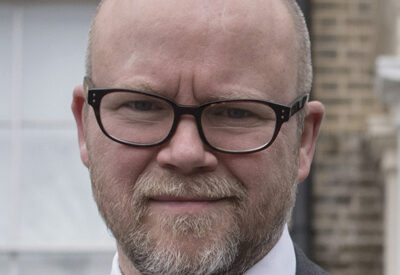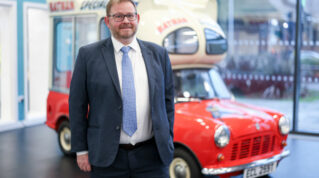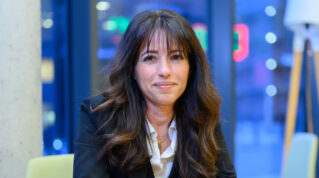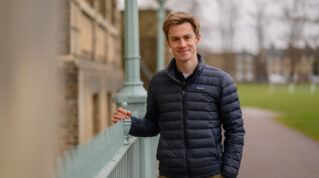It is 5.30am on the day I am meeting Toby Young, the gonzo journalist turned right-wing columnist turned free school founder, and my cat is making life difficult. He’s mewing loudly. I decide he must be dying of dehydration and get out of bed to find out what’s wrong.
Nothing is wrong. He has plentiful water and food. He just wants attention, and fresher food.
Young is not dissimilar. In 2009 he was living in London with four young children and a writing career that paid enough for fine living, but not for four places at fine private schools. This shouldn’t have mattered. By then, the capital’s education system was already on its way to being the best in the world. But Young, like my cat, wanted more than had already been served.
“I now know how hard teachers work and what a difficult job it is”
Before the 2010 general election he slagged off the state school system via every medium open to him and demanded the upcoming Conservative government to allow him – and other parents “like him” – to open the sort of school they wanted.
At the time I was a teacher in the sort of school Young would lambast. Schools like ours didn’t teach Latin. Schools like ours had low expectations. He, on the other hand, knew the source of all brilliance. He would sort it out. He, Mr Journalist Man, would be the saviour of mediocrity.
Like the cat, he didn’t just want something new, he craved attention too.
West London free school is not the first school you see when walking from Ravenscourt Park tube station. That sight goes to the beautiful gates of Latymer Upper – a private school founded in 1624 that costs more than £18,000 a year to attend.
The school that Young, with a troupe of other founders, pushed to open is some way right of Latymer, hidden behind a white wall and flanked by a high-rise Premier Inn.
The elegant building behind the wall, Palingswick House, was built as a school in the 19th century. But it was a slow, fraught and expensive business to acquire it as a finalised permanent site – at a cost of £5.8 million (before the refurb) for a school with just 600 places. Pupils were scattered across several sites while the work was completed.
The group now also operate three primary schools, on separate sites, and a sixth form is due to open in September.
Young isn’t there when I arrive, but I meet Hywel Jones, the soft-spoken headteacher, who is charming, intelligent, and down-to-earth. Appointed in 2014 as the third head in three years, he said at the time he was not daunted by leading a school that was a “national goldfish bowl”. As we wander around he gives the impression that such tours happen a lot.
We are joined by Young, who says he manages to go on “learning walks” about four times a term. “Though we won’t go into any classrooms with my daughter in, she finds it embarrassing.”
In a music lesson pupils are diligently learning keyboard and recording their progress on iPads. Year 11 is practising GCSE maths papers. In a science cover lesson, pupils are answering questions out of a textbook.
It’s all very normal. Nice normal. Calm normal. But, well … just normal.
I spot a poster about a barn dance later in the day and am encouraged to attend. It has been planned by the music department, which is particularly effusive about the school. Ten per cent of pupils are selected for musical aptitude (Jones tells me that the test is “not game-able”) and each receives dedicated musical tuition on a scholarship reminiscent of Oxbridge. I am also told all pupils study classical languages: another subject for which Oxbridge has lots of places, and few applicants. If many pupils go to those universities in a few years’ time, it won’t be an accident.
There’s a café across the road. We go in, but Young thinks it’s too loud. So he takes me to a coffee shop in a nearby garden centre. With trains rushing overhead. And crying babies.
We talk about the irony of our meeting. He, the journalist, is now an academy trust chief executive. Me, the one-time teacher, is now the interviewer.
I ask what motivated him to continue with the school in the face of adversity – including fights over the buildings and his two lost headteachers.
“I believed very strongly in the concept of setting up a school that could provide a knowledge-based education to children of all backgrounds regardless of abilities, and was confident enough in the strength of that concept not to be dissuaded by the opposition.
“I had four children who at the time were all at primary school. There was the nagging worry about where they would go to secondary school if we didn’t get a free school open.”
Why not send them to private school? “I couldn’t afford it… Also I didn’t go to private school myself, and seeing my friends – some of them – who had sent their children to one, they seemed to care too much about things like whether or not their child got an invite to a Russian billionaire tycoon’s daughter’s 16th birthday party.
“Their children seemed to grow up very quickly and absorb lots of the plutocratic values that I was exposed to when I worked at Vanity Fair [in New York] in the mid-90s and have a visceral dislike of.
“And, I suppose, I really want my children to be educated alongside children from all parts of the local community and not a tiny elite.”
Why not walk away once it opened, though? Why become the chief executive?
“I did think at the beginning that I would bow out once the school opened.” He pauses. “I suppose, having spent two years working very hard to get the school and having persuaded local parents to place their faith in you and your colleagues, you can’t really walk away. You have an overwhelming sense of responsibility and that grows each year as you get another 120 kids. I think the fact it didn’t have a permanent site made me reluctant to take a back seat as well.”
He sips his flat white coffee. “Having said that I am stepping down at the end of this academic year.”
An advert for his replacement went out the day before we meet. The new CEO will be full-time, (Young does three days) and, unlike in 2013 – when the role was last advertised but failed to turn up anyone suitable – more money is available.
What sort of person is he looking for? “Our multi-academy trust needs to grow if it is going to become sustainable over the long term. The Department for Education’s research about multi-academy trusts suggests that anything less than eight to ten schools is quite hard to sustain. What we need, if we are going to grow from four schools to eight to ten schools over the next five years, is someone with the experience and skills to grow an organisation like ours. So, ideally, an ex-headteacher or someone who has already run a medium-sized academy trust or someone who has experienced a growing comparable business.”
Does he have someone in mind? “No.” Does he believe they exist? “I hope so.”
Back in 2011, just before the first school opened, he told an interviewer that he planned to open 25 schools, and develop a private company to advise on the opening of schools. One of the reasons why Young recently suggested a new college for schools leadership training, which Sir Michael Wilshaw has urged the government to find funds for, is that he now realises there is a dearth of people who can make 25 schools suddenly appear and run them effectively.
“The sorts of people who I think, I hope, the course at the college would appeal to are senior managers of West End theatres or of NHS trusts. Having worked in a theatre company would be particularly good.”
This sounds an outlandish attention-grabbing statement. I prod further. He prods back.
“I am always struck with the similarity between what actors do and what teachers do. Teachers are kind of on stage and are, at some level, having to perform and having to carry off a performance. The skills aren’t dissimilar and some of the strain that puts on people is the same – it’s exhausting having to perform for four or five hours a day, sometimes more. It’s like having to do a matinee and an evening performance of a West End show every day. So, someone who is used to managing a troupe of actors, and dealing with the stresses and strains they are under, would be quite well suited in some ways to being a senior leader in a school.”
“I am prepared to vote with my children”
It is a poignant and thoughtful answer. Wondering if his attention-grabbing habit has waned I ask if, given what he now knows about the difficulties of leading schools, he regrets his disparaging remarks around the time of the 2010 general election.
“Yes. There are a lot of things I regret,” he says. “I was very critical of England’s public education system under the last Labour government, and I hadn’t grasped how difficult it is to do better, and to bring about system-wide improvement.
“The last government and this government have achieved a remarkable amount, and I do think the direction of travel is the right direction, but there is no question that it was arrogant of me to believe that just having high expectations and believing in the benefits of a knowledge-based education for all, that those things alone would be enough to create successful schools.”
Did he really think back in 2010 those things would solve everything, or was that just media bluster?
“As someone coming into education from the outside, the bits you see of other schools are only the tip of the iceberg. You’re not aware of everything that is going on beneath the surface. You think, ‘well, I could do better than that’, as you are pointing to the tip of the iceberg, without realising how much more there is to it.”
He sighs. “If I could rewind six years, and know then what I know now, I would have been much less critical of other schools, local authorities, and England’s public education system in general.”
But, he can’t go back. So what of celebrities who follow in his path? In the US, Puff Daddy, the hip-hop artist, is advocating for a new charter school [the US equivalent of a free school]. What’s his best advice?
“Try to fly under the radar and not make any public statements about education, but support the people you are working with financially and emotionally.”
I begin another question. He interrupts.
“Can I just say … one thing I really regret is that I gave a quick interview in an ITV programme about teachers in which I was quite dismissive about workload complaints. I regret that, enormously. I now know how hard teachers work and what a difficult job it is.”
He looks pained.
I ask what he’s proud of. He talks at length about his free school “team” – the heads of the schools across the trust (not just Jones, but also the primary leaders), the teachers, the pupils, the other founders. He insists the sustainable embodiment of a vision dreamed up not just by him, has been done by the group. He names several of them. He is very concerned that it doesn’t appear in the interview that he did this all alone.
But he admits that there were moments when it felt “quite fragile. For it not to be fragile any more, but in rude good health, is a source of pride.”
He looks plaintive. As if there’s more to be said. Does he wish he’d been asked another question? “Yes,” he says, “it’s that… not only is my daughter in year 8, but my son is going into the secondary in September – and I think it’s quite important that people involved in running schools should, if possible, send their kids to those schools.
“It has always struck me as scandalous that successive generations of secretaries of state and education ministers went private when they were responsible for the public education system, and too many governors and heads don’t send their children to the schools they work at, or opt-out of the state sector.
“I am prepared to vote with my children. Not because I feel I have to, but because I now genuinely think this is one of the best secondary schools in the area.”
He finishes his coffee. And finally looks happy to wind up the interview.
The next day I get an email asking if I made it to the barn dance. I tell him that I didn’t but that I had let Jones know. We agree the head would make a great future profile interview of his own.
A few days later, I discover the cat has eaten a roast chicken left to cool. He slinks away when caught, looking guilty for taking what wasn’t his. Given half a chance, I suspect he’d do the same again.
It’s a personal thing
What is your favourite book?
David Copperfield. It is just such a wonderful story, it is so moving and the characters are so vivid. I read Nicholas Nickleby first and thought that David Copperfield was a polished, better version. No other book has given me more pleasure.
If you could be any animal, what would you be?
I would be a Hungarian vizsla puppy. They are very pretty and quite big. We have just got one and my wife dotes on him, as do all my children. I would like to be him so I could soak up all that love and attention.
If you were invisible for a day, what would you do?
I’d go on a series of learning walks across all our schools. The problem with learning walks is that Heisenberg’s uncertainty principle applies; you are never sure if it is really like that when you’re not there. If you were invisible, you could take the uncertainty away. But I don’t think it would be different!
If you could live in any period in history, which would you pick?
I would quite like to live in ancient Rome. But of course when one thinks about that one imagines one would at the very least be a senator . . . if I were a slave I imagine it would not be much fun. It’s like when people say they want to live in the 18th century without realising that, as one historian pointed out, people in the 18th century were in pain half the time.








He should be thoroughly ashamed of the destruction he & his ilk have wrought in education in the UK. His naievity regarding teaching & teacher’s workload isn’t charming or endearing, it disgraceful & shows how his actions were entirely selfish (as he seems happy to admit). His wish to shelter & promote his, and other middle class parents’ children, has been at huge cost to those outside of his elite clique. Ps. Neutering felines usually calms their behaviour.
‘One of the reasons why Young recently suggested a new college for schools leadership training, which Sir Michael Wilshaw has urged the government to find funds for, is that he now realises there is a dearth of people who can make 25 schools suddenly appear and run them effectively.’
Don’t we have a college for schools leadership training? The Future leaders Trust which runs the ‘Executive Educators Programme’, promises to ‘develop the necessary skills to run develop and expand a Multi-Academy Trust’. It’s reassuring to know that Free Schools now hope for leaders to have some applicable qualifications, but the qualities and experience described by Mr Young as being suitable for the role are alarming.
Academy Trusts have to be “Companies not for profit limited by Guarantee.” They are then registered as charities. In fact almost all charities have this structure.
Limited companies consist of members. In the case of a for profit company like Marks and Spencer, they are shareholders, who get a share of the profits in the form of a dividend. In the case of a not for profit company, the company consists of members, who are instead of shareholders, and do not get dividends.
So when you set up an academy trust, the original founders of the Trust, the ones who actually sign the form, are the members. From then on how new members get appointed is regulated by the particular rules the founding members agreed. It is the members, meeting in a general meeting who appoint the Board, by a majority vote. Board members do not have to be members. Consequently if you have a majority of the members you control the whole thing.
West London Free School is a MAT which runs several schools
It has just four members, two of whom are Toby Young and his wife. As decisions by members require a majority vote, if the meeting has a full attendance of four, Toby Young and his wife, if they have an agreed position can veto any decision. If they have the agreement of only one other member they carry the day.
It is this group that appoint the Board. Toby Young was the founding Chair of the Board, being elected to that position by a Board whose members he had had the decisive (with the help of his wife) role in appointing. In due course this Board, under his chairmanship, decided to create the paid role of Chief Executive of the Trust. Also in due course the Board set about recruiting a suitable person to full this post. It turned out that, after careful consideration, the conclusion the Board came to, under Toby Young’s chairmanship, was that the best person for the paid job of Chief Executive was Toby Young. The appointment was duly made and on the morning of the day Toby Young became Chief Executive of the Trust, he resigned as Chair of the Board which had appointed him to this job. Please note there is nothing illegal in this.
You will see that the practical effect of this is that as CEO of the Trust, Toby Young is accountable to the Board, and the Board is accountable to the members, and Toby Young and his wife make up half the members.
Toby Young now tells us that having done the job for a few years, ( which by implication he found a lot harder than he thought – note the turnover in Heads mentioned in the article) he is now standing down and they will be looking for an outstanding individual to succeed him. The impression being given in the interview that he expects to have a decisive role in this appointment.
I think there are a number of troubling features in this picture, all summed up by pointing out how he seems to behave like an entrepreneur who has set up a new business which he owns, when in fact it was ALL paid for by the taxpayer.
Its certainly a good position to be in when you can appoint yourself to a job, decide what the working hours and salary of that job is, and have all the costs met by the tax payer.
Couldn’t care less. As a parent, I have just one question: do my children get a good education?
Too many parents put their own politics above the prospects for their children. Just like the “kids strike” which was nothing of the sort. My children are not stressed, or pressured, or anything else by testing. The only people who are are teachers and parents. What are they worried about? It’s no coincidence that a child’s test results not only measure the child’s ability, but also the performance of the teacher and the parents.
James – not all children are bothered by the tests, it’s true. But it does not follow that because some aren’t then all aren’t. And isn’t there a degree of smugness in your claim that the tests are a measure of parental capability?
That said, there is a more important reason that stress: the effect on children’s education of frequent, mandatory tests. Children in England are among the most-tested in the world. Few countries have mandatory tests at the end of primary school and I found none which set them at age 6/7.
The OECD warned five years ago there was too much emphasis on test results in England and this risked negative consequences. http://www.localschoolsnetwork.org.uk/2016/05/as-thousands-of-parents-protest-against-tests-theres-no-evidence-frequent-testing-raises-performance
Heisenberg’s Uncertainty Principle would still apply if he was invisible. It’s a fundamental property of all quantum systems regardless of whether or not they are being observed. Whether or not classrooms are governed by the laws of quantum physics in this way, I couldn’t say.
Yes, a better analogy would be the Hawthorne effect – people behave differently when they know they’re being observed.
These comments exemplify the arrogant complacency so characteristic of the educational establishment. Toby Young was disarmingly frank about earlier misjudgements and modest about what has been a remarkably successful project. In return he receives ad hominem attacks and snide comments about ‘elite cliques’. I have taught in the public sector for twenty years and can only admire his bravery an integrity.
Might I ask the salary paid for 3 days work a week. What salary might the full time chair expect?
I ask because the wholesale destruction of LEA structures continues apace, and the replacement of career structured accountable civil servants by unaccountable and ignorant self-serving plutocrats has both a financial and moral cost for our society.
Add to that the cost of new structures to build anew the cpd of potential senior civil servants and you’ll get my drift.
As with BHS, fat cats are permitted to raid the larder in which funds set aside by the society that created them for their future prosperity and then benefit from the sale of the larder to even more unscrupulous mates. T S Elliot wrote well about such beasts: “He’s outwardly respectable. (They say he cheats at cards.)
And his footprints are not found in any file of Scotland Yard’s.
And when the larder’s looted, or the jewel-case is rifled,
Or when the milk is missing, or another Peke’s been stifled,
Or the greenhouse glass is broken, and the trellis past repair –
Ay, there’s the wonder of the thing! Macavity’s not there!
We did have a National College for School Leadership which was set up by the Blair Government. As a secondary Head Teacher, it provided me with access to training and research which allowed me to strengthen my leadership skills and turn around a failing school.
However, it was costly. It suffered from excessive political interference which forced it to change focus and significantly reduce costs, particularly during the reign of Michael Gove. We are now seeing the cost of extreme accountability and a failure to develop and support school leaders.
How ironic to see Toby Young and Michael Wilshaw, who have both done so much to criticise and undermine school leaders, calling for a return to a Leadership College.
£5.8 million! The taxpayers alliance should have a field day at that
I recognise some difficult conflicts of interest and I hold no great love for Toby Young. He wants West London Free School to deliver “an academically rigorous curriculum … open to all, regardless of income, ability or faith”. There IS an element of public service in his initiative and he has followed through on his vision. Despite his shortcomings, I’ve far more respect for Tony Young than the masses of politicians who talk about the benefits of state education and then shamefully enrol their own children at private schools.
Like most people, I’d rather live by self-interest than be mean-spirited.
Having done it myself (and helped others doing the same), running a school is extraordinarily challenging, stressful and complex but also invigorating and satisfying. You can (and should) change lives.
I have an understanding of what Toby Young thought he could do (it seems so easy – everyone who has been to school knows how it should be done) but it is refreshing to see him acknowledging that it is much tougher than he thought. Maybe that’s why we have a headteacher recruitment crisis and his organisation got through three in as many years…?
Toby Young appears to have had a Pauline conversion: he’s admitted his earlier comments on teachers’ short hours were ill-advised.
I hope he will also reconsider remarks made about parents who kept their children off school for one day in a protest against primary school tests. According to his Spectator article written just days before the Schools Week interview was published, Young said such parents were ‘moronic, selfish middle-class warriors [who] are entrenching class divisions’. He goes on to say testing is essential in order to teach children to read and write, and the concerned parents ‘don’t think primary schools should be teaching the three Rs’.
That’s a straw man argument: it doesn’t follow that in expressing concern about the excessive testing regime in England – a concern shared by the OECD – that parents and others who point out the downside of such testing are against children learning.
Formative assessment which informs teaching is essential; frequent, mandatory summative testing is not. It’s a pity when politicians and some journalists don’t appear to recognise or value the difference.
http://www.spectator.co.uk/2016/05/if-the-sats-strike-parents-get-their-way-only-the-poorer-kids-will-suffer/